Sustainable Tourism Development Report: UK Case Study and Analysis
VerifiedAdded on 2020/06/04
|12
|4210
|30
Report
AI Summary
This report provides a comprehensive analysis of sustainable tourism development, with a specific focus on the United Kingdom. It begins with an introduction to the concept of sustainable tourism and its importance. The report then delves into the benefits for stakeholders, advantages and disadvantages of public/private sector tourism planning, and the features of tourism development planning at different levels (international, national, and local). It also highlights the importance of interactive planning systems and processes, as well as methods for measuring tourist impact. The report further explores the concept of sustainability in tourism, identifying factors that hinder sustainable development and various stages in planning for sustainability. It also addresses conflict resolution, balancing supply and demand, and evaluates moral and ethical issues of enclave tourism. The report concludes by discussing current issues associated with tourism development in the UK and providing recommendations for future development, emphasizing the need for effective planning and sustainable practices to ensure long-term benefits for the environment, society, and economy.
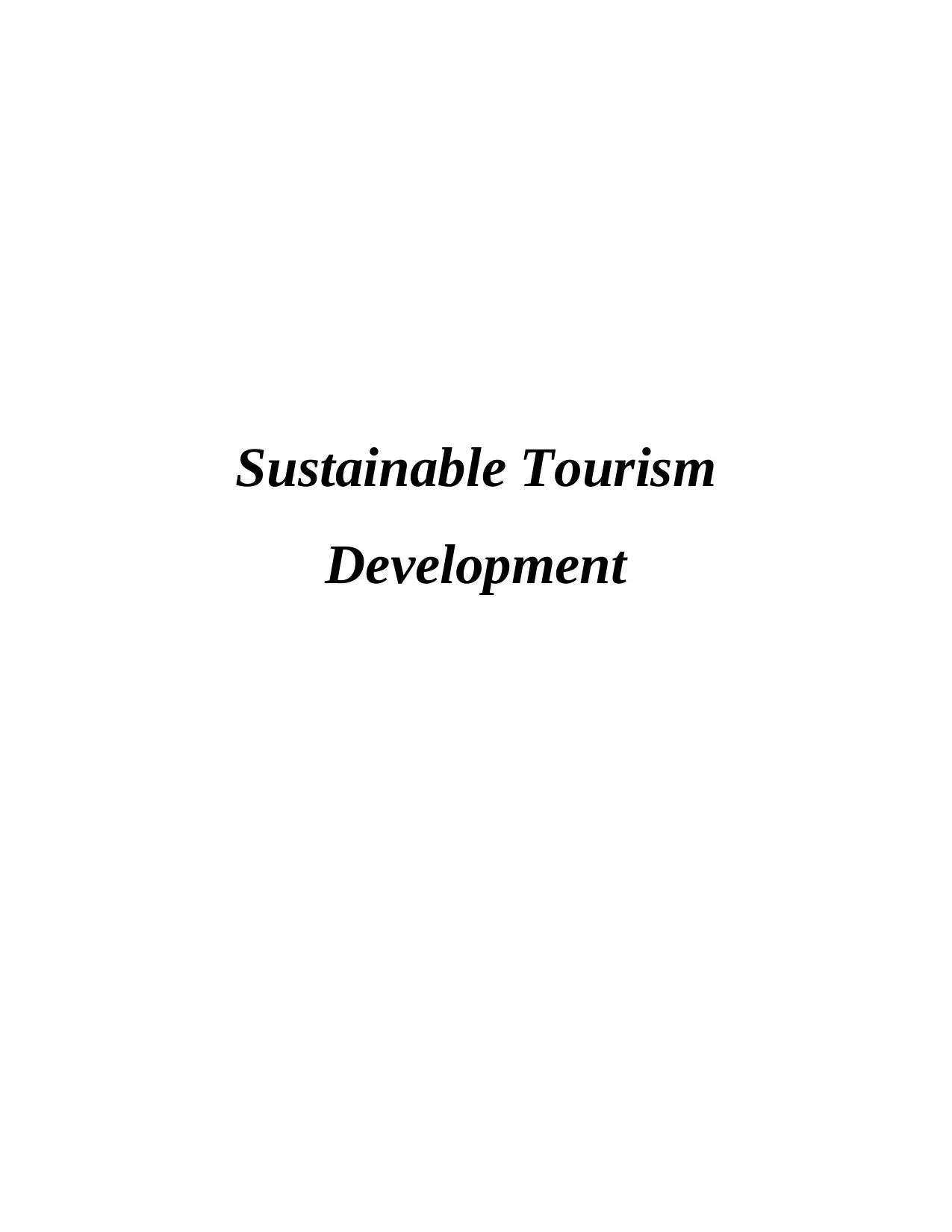
Sustainable Tourism
Development
Development
Paraphrase This Document
Need a fresh take? Get an instant paraphrase of this document with our AI Paraphraser
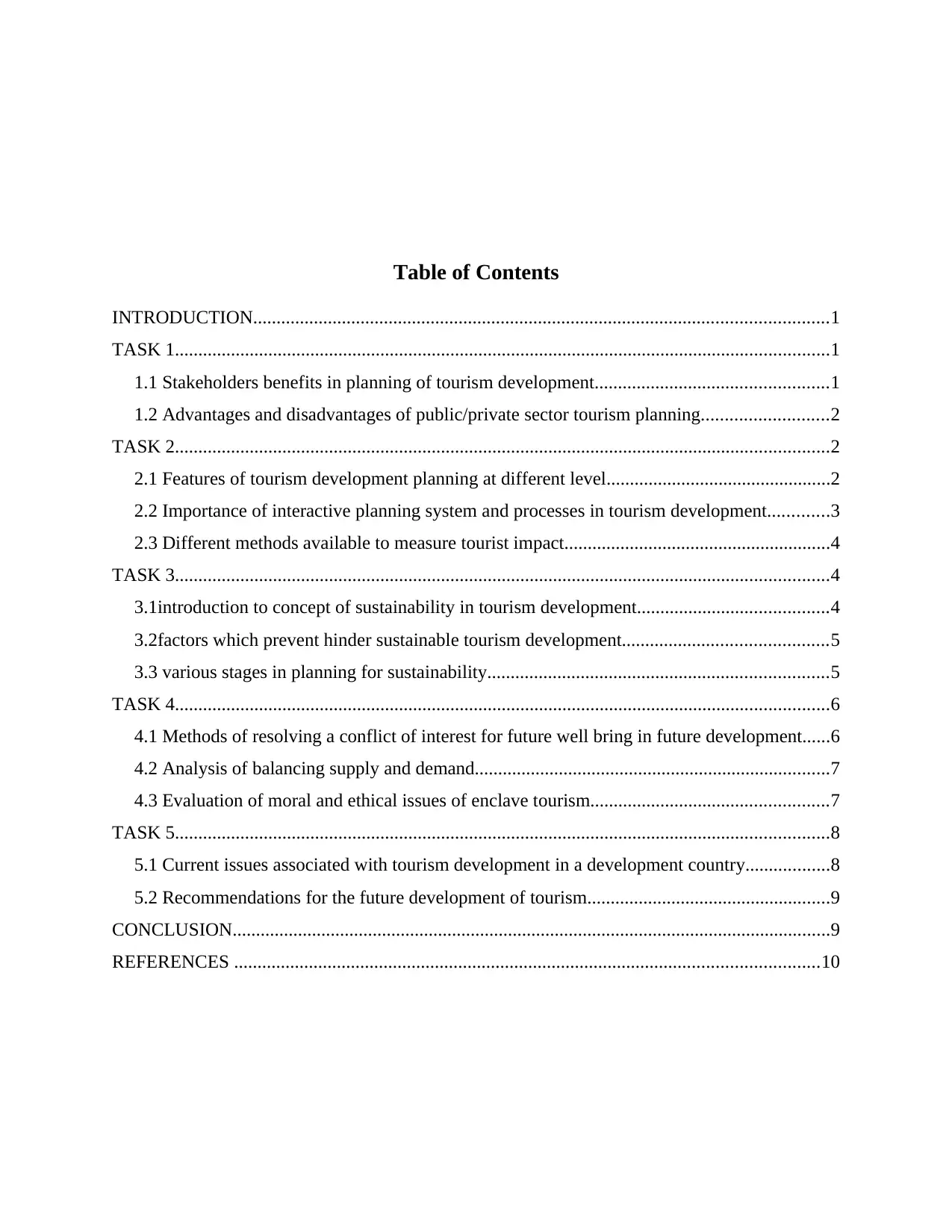
Table of Contents
INTRODUCTION...........................................................................................................................1
TASK 1............................................................................................................................................1
1.1 Stakeholders benefits in planning of tourism development..................................................1
1.2 Advantages and disadvantages of public/private sector tourism planning...........................2
TASK 2............................................................................................................................................2
2.1 Features of tourism development planning at different level................................................2
2.2 Importance of interactive planning system and processes in tourism development.............3
2.3 Different methods available to measure tourist impact.........................................................4
TASK 3............................................................................................................................................4
3.1introduction to concept of sustainability in tourism development.........................................4
3.2factors which prevent hinder sustainable tourism development............................................5
3.3 various stages in planning for sustainability.........................................................................5
TASK 4............................................................................................................................................6
4.1 Methods of resolving a conflict of interest for future well bring in future development......6
4.2 Analysis of balancing supply and demand............................................................................7
4.3 Evaluation of moral and ethical issues of enclave tourism...................................................7
TASK 5............................................................................................................................................8
5.1 Current issues associated with tourism development in a development country..................8
5.2 Recommendations for the future development of tourism....................................................9
CONCLUSION................................................................................................................................9
REFERENCES .............................................................................................................................10
INTRODUCTION...........................................................................................................................1
TASK 1............................................................................................................................................1
1.1 Stakeholders benefits in planning of tourism development..................................................1
1.2 Advantages and disadvantages of public/private sector tourism planning...........................2
TASK 2............................................................................................................................................2
2.1 Features of tourism development planning at different level................................................2
2.2 Importance of interactive planning system and processes in tourism development.............3
2.3 Different methods available to measure tourist impact.........................................................4
TASK 3............................................................................................................................................4
3.1introduction to concept of sustainability in tourism development.........................................4
3.2factors which prevent hinder sustainable tourism development............................................5
3.3 various stages in planning for sustainability.........................................................................5
TASK 4............................................................................................................................................6
4.1 Methods of resolving a conflict of interest for future well bring in future development......6
4.2 Analysis of balancing supply and demand............................................................................7
4.3 Evaluation of moral and ethical issues of enclave tourism...................................................7
TASK 5............................................................................................................................................8
5.1 Current issues associated with tourism development in a development country..................8
5.2 Recommendations for the future development of tourism....................................................9
CONCLUSION................................................................................................................................9
REFERENCES .............................................................................................................................10
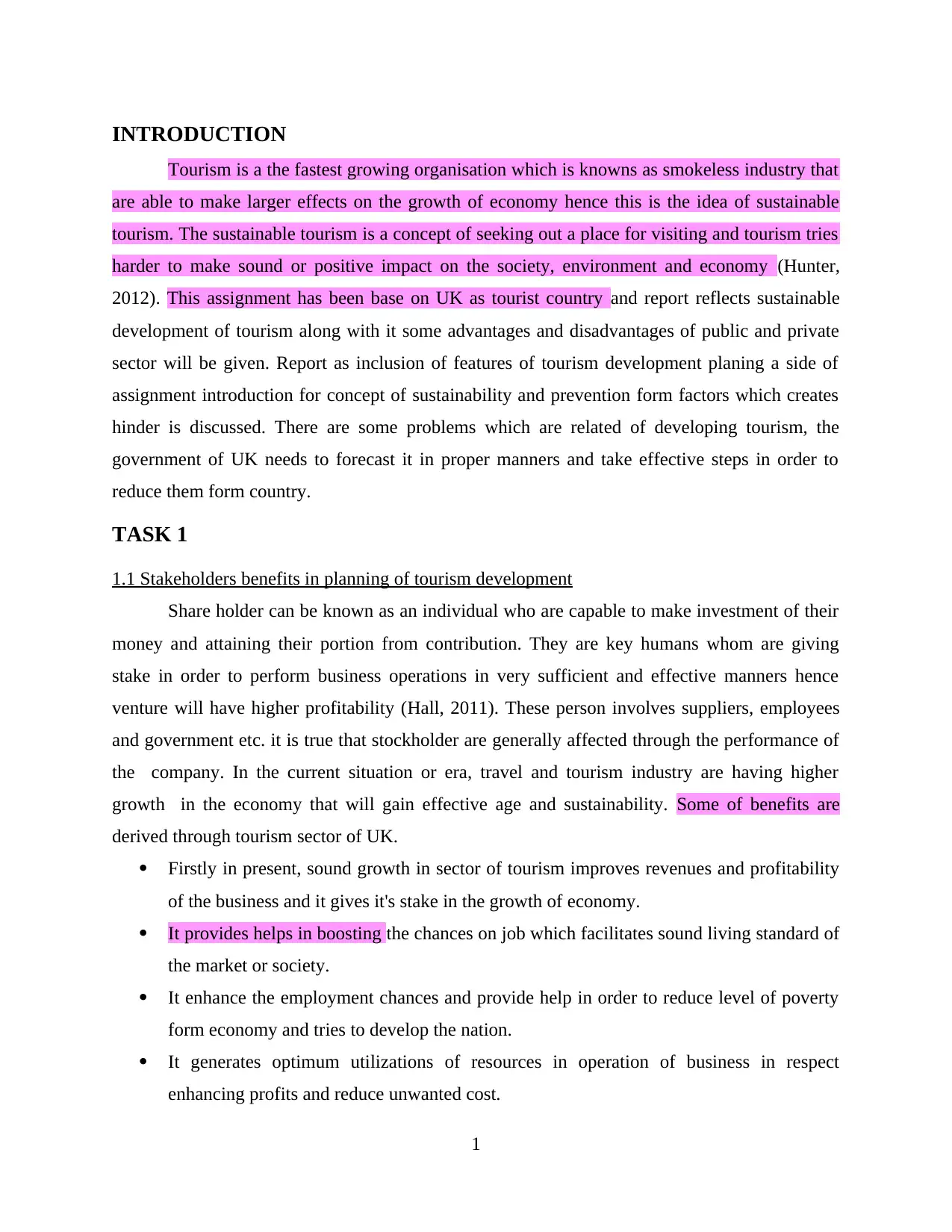
INTRODUCTION
Tourism is a the fastest growing organisation which is knowns as smokeless industry that
are able to make larger effects on the growth of economy hence this is the idea of sustainable
tourism. The sustainable tourism is a concept of seeking out a place for visiting and tourism tries
harder to make sound or positive impact on the society, environment and economy (Hunter,
2012). This assignment has been base on UK as tourist country and report reflects sustainable
development of tourism along with it some advantages and disadvantages of public and private
sector will be given. Report as inclusion of features of tourism development planing a side of
assignment introduction for concept of sustainability and prevention form factors which creates
hinder is discussed. There are some problems which are related of developing tourism, the
government of UK needs to forecast it in proper manners and take effective steps in order to
reduce them form country.
TASK 1
1.1 Stakeholders benefits in planning of tourism development
Share holder can be known as an individual who are capable to make investment of their
money and attaining their portion from contribution. They are key humans whom are giving
stake in order to perform business operations in very sufficient and effective manners hence
venture will have higher profitability (Hall, 2011). These person involves suppliers, employees
and government etc. it is true that stockholder are generally affected through the performance of
the company. In the current situation or era, travel and tourism industry are having higher
growth in the economy that will gain effective age and sustainability. Some of benefits are
derived through tourism sector of UK.
Firstly in present, sound growth in sector of tourism improves revenues and profitability
of the business and it gives it's stake in the growth of economy.
It provides helps in boosting the chances on job which facilitates sound living standard of
the market or society.
It enhance the employment chances and provide help in order to reduce level of poverty
form economy and tries to develop the nation.
It generates optimum utilizations of resources in operation of business in respect
enhancing profits and reduce unwanted cost.
1
Tourism is a the fastest growing organisation which is knowns as smokeless industry that
are able to make larger effects on the growth of economy hence this is the idea of sustainable
tourism. The sustainable tourism is a concept of seeking out a place for visiting and tourism tries
harder to make sound or positive impact on the society, environment and economy (Hunter,
2012). This assignment has been base on UK as tourist country and report reflects sustainable
development of tourism along with it some advantages and disadvantages of public and private
sector will be given. Report as inclusion of features of tourism development planing a side of
assignment introduction for concept of sustainability and prevention form factors which creates
hinder is discussed. There are some problems which are related of developing tourism, the
government of UK needs to forecast it in proper manners and take effective steps in order to
reduce them form country.
TASK 1
1.1 Stakeholders benefits in planning of tourism development
Share holder can be known as an individual who are capable to make investment of their
money and attaining their portion from contribution. They are key humans whom are giving
stake in order to perform business operations in very sufficient and effective manners hence
venture will have higher profitability (Hall, 2011). These person involves suppliers, employees
and government etc. it is true that stockholder are generally affected through the performance of
the company. In the current situation or era, travel and tourism industry are having higher
growth in the economy that will gain effective age and sustainability. Some of benefits are
derived through tourism sector of UK.
Firstly in present, sound growth in sector of tourism improves revenues and profitability
of the business and it gives it's stake in the growth of economy.
It provides helps in boosting the chances on job which facilitates sound living standard of
the market or society.
It enhance the employment chances and provide help in order to reduce level of poverty
form economy and tries to develop the nation.
It generates optimum utilizations of resources in operation of business in respect
enhancing profits and reduce unwanted cost.
1
⊘ This is a preview!⊘
Do you want full access?
Subscribe today to unlock all pages.

Trusted by 1+ million students worldwide
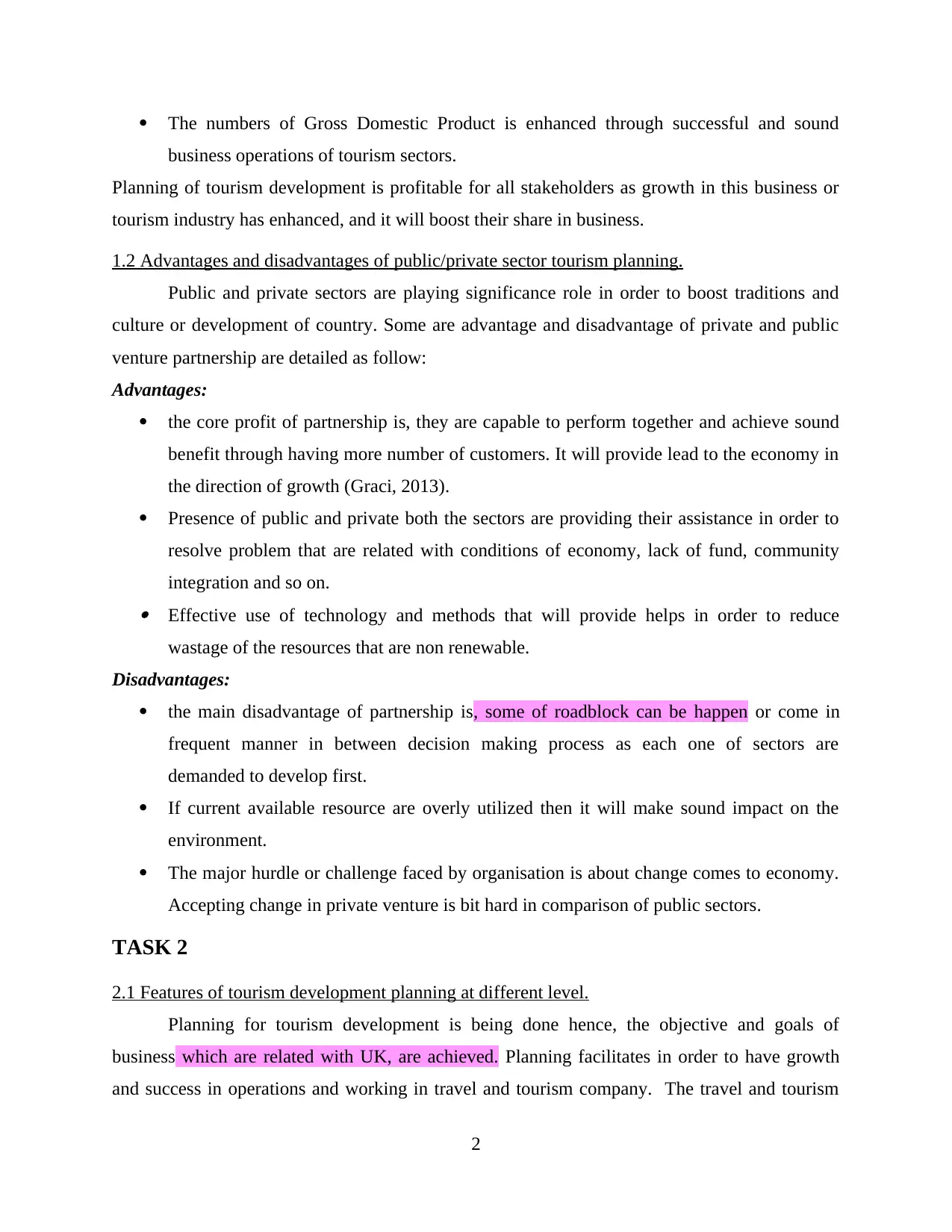
The numbers of Gross Domestic Product is enhanced through successful and sound
business operations of tourism sectors.
Planning of tourism development is profitable for all stakeholders as growth in this business or
tourism industry has enhanced, and it will boost their share in business.
1.2 Advantages and disadvantages of public/private sector tourism planning.
Public and private sectors are playing significance role in order to boost traditions and
culture or development of country. Some are advantage and disadvantage of private and public
venture partnership are detailed as follow:
Advantages:
the core profit of partnership is, they are capable to perform together and achieve sound
benefit through having more number of customers. It will provide lead to the economy in
the direction of growth (Graci, 2013).
Presence of public and private both the sectors are providing their assistance in order to
resolve problem that are related with conditions of economy, lack of fund, community
integration and so on. Effective use of technology and methods that will provide helps in order to reduce
wastage of the resources that are non renewable.
Disadvantages:
the main disadvantage of partnership is, some of roadblock can be happen or come in
frequent manner in between decision making process as each one of sectors are
demanded to develop first.
If current available resource are overly utilized then it will make sound impact on the
environment.
The major hurdle or challenge faced by organisation is about change comes to economy.
Accepting change in private venture is bit hard in comparison of public sectors.
TASK 2
2.1 Features of tourism development planning at different level.
Planning for tourism development is being done hence, the objective and goals of
business which are related with UK, are achieved. Planning facilitates in order to have growth
and success in operations and working in travel and tourism company. The travel and tourism
2
business operations of tourism sectors.
Planning of tourism development is profitable for all stakeholders as growth in this business or
tourism industry has enhanced, and it will boost their share in business.
1.2 Advantages and disadvantages of public/private sector tourism planning.
Public and private sectors are playing significance role in order to boost traditions and
culture or development of country. Some are advantage and disadvantage of private and public
venture partnership are detailed as follow:
Advantages:
the core profit of partnership is, they are capable to perform together and achieve sound
benefit through having more number of customers. It will provide lead to the economy in
the direction of growth (Graci, 2013).
Presence of public and private both the sectors are providing their assistance in order to
resolve problem that are related with conditions of economy, lack of fund, community
integration and so on. Effective use of technology and methods that will provide helps in order to reduce
wastage of the resources that are non renewable.
Disadvantages:
the main disadvantage of partnership is, some of roadblock can be happen or come in
frequent manner in between decision making process as each one of sectors are
demanded to develop first.
If current available resource are overly utilized then it will make sound impact on the
environment.
The major hurdle or challenge faced by organisation is about change comes to economy.
Accepting change in private venture is bit hard in comparison of public sectors.
TASK 2
2.1 Features of tourism development planning at different level.
Planning for tourism development is being done hence, the objective and goals of
business which are related with UK, are achieved. Planning facilitates in order to have growth
and success in operations and working in travel and tourism company. The travel and tourism
2
Paraphrase This Document
Need a fresh take? Get an instant paraphrase of this document with our AI Paraphraser
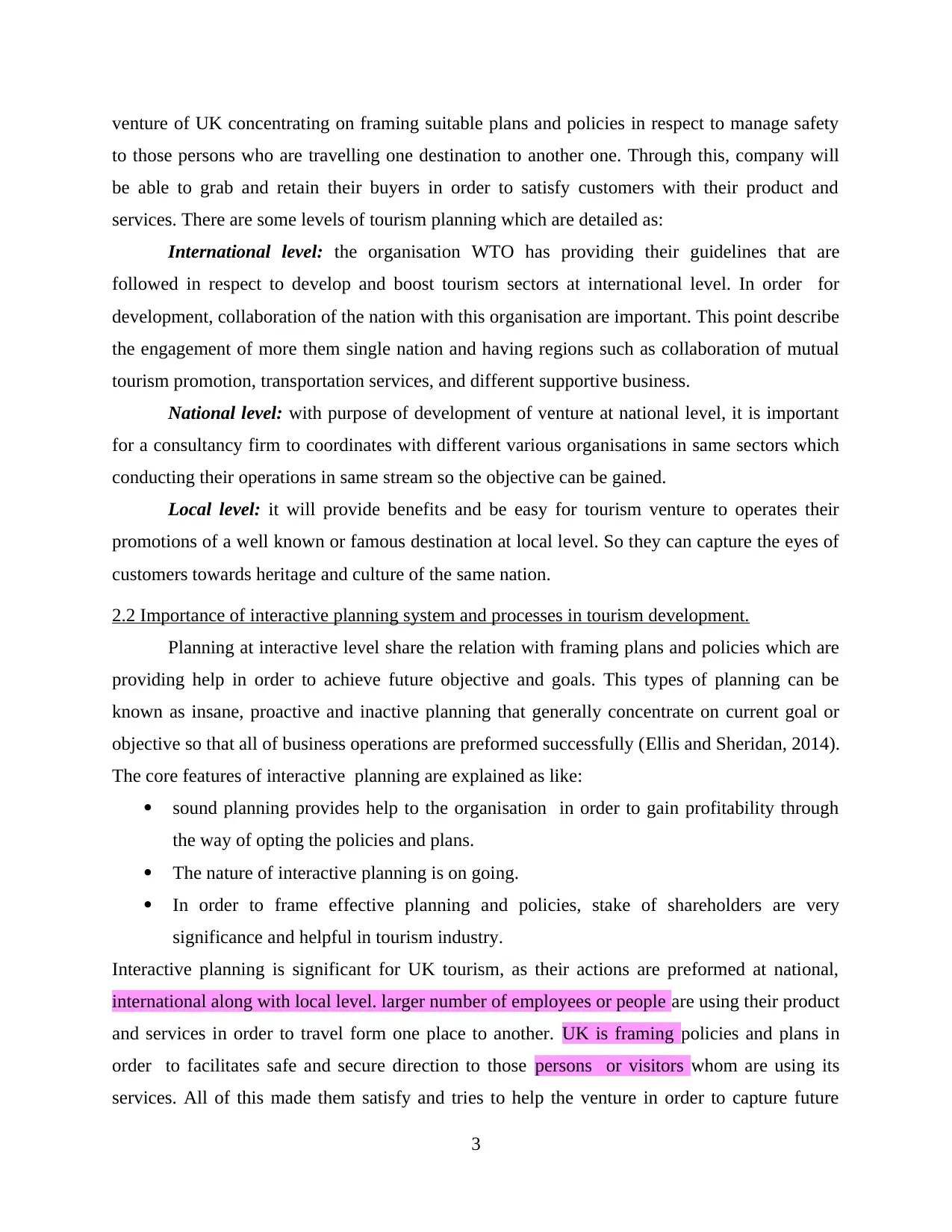
venture of UK concentrating on framing suitable plans and policies in respect to manage safety
to those persons who are travelling one destination to another one. Through this, company will
be able to grab and retain their buyers in order to satisfy customers with their product and
services. There are some levels of tourism planning which are detailed as:
International level: the organisation WTO has providing their guidelines that are
followed in respect to develop and boost tourism sectors at international level. In order for
development, collaboration of the nation with this organisation are important. This point describe
the engagement of more them single nation and having regions such as collaboration of mutual
tourism promotion, transportation services, and different supportive business.
National level: with purpose of development of venture at national level, it is important
for a consultancy firm to coordinates with different various organisations in same sectors which
conducting their operations in same stream so the objective can be gained.
Local level: it will provide benefits and be easy for tourism venture to operates their
promotions of a well known or famous destination at local level. So they can capture the eyes of
customers towards heritage and culture of the same nation.
2.2 Importance of interactive planning system and processes in tourism development.
Planning at interactive level share the relation with framing plans and policies which are
providing help in order to achieve future objective and goals. This types of planning can be
known as insane, proactive and inactive planning that generally concentrate on current goal or
objective so that all of business operations are preformed successfully (Ellis and Sheridan, 2014).
The core features of interactive planning are explained as like:
sound planning provides help to the organisation in order to gain profitability through
the way of opting the policies and plans.
The nature of interactive planning is on going.
In order to frame effective planning and policies, stake of shareholders are very
significance and helpful in tourism industry.
Interactive planning is significant for UK tourism, as their actions are preformed at national,
international along with local level. larger number of employees or people are using their product
and services in order to travel form one place to another. UK is framing policies and plans in
order to facilitates safe and secure direction to those persons or visitors whom are using its
services. All of this made them satisfy and tries to help the venture in order to capture future
3
to those persons who are travelling one destination to another one. Through this, company will
be able to grab and retain their buyers in order to satisfy customers with their product and
services. There are some levels of tourism planning which are detailed as:
International level: the organisation WTO has providing their guidelines that are
followed in respect to develop and boost tourism sectors at international level. In order for
development, collaboration of the nation with this organisation are important. This point describe
the engagement of more them single nation and having regions such as collaboration of mutual
tourism promotion, transportation services, and different supportive business.
National level: with purpose of development of venture at national level, it is important
for a consultancy firm to coordinates with different various organisations in same sectors which
conducting their operations in same stream so the objective can be gained.
Local level: it will provide benefits and be easy for tourism venture to operates their
promotions of a well known or famous destination at local level. So they can capture the eyes of
customers towards heritage and culture of the same nation.
2.2 Importance of interactive planning system and processes in tourism development.
Planning at interactive level share the relation with framing plans and policies which are
providing help in order to achieve future objective and goals. This types of planning can be
known as insane, proactive and inactive planning that generally concentrate on current goal or
objective so that all of business operations are preformed successfully (Ellis and Sheridan, 2014).
The core features of interactive planning are explained as like:
sound planning provides help to the organisation in order to gain profitability through
the way of opting the policies and plans.
The nature of interactive planning is on going.
In order to frame effective planning and policies, stake of shareholders are very
significance and helpful in tourism industry.
Interactive planning is significant for UK tourism, as their actions are preformed at national,
international along with local level. larger number of employees or people are using their product
and services in order to travel form one place to another. UK is framing policies and plans in
order to facilitates safe and secure direction to those persons or visitors whom are using its
services. All of this made them satisfy and tries to help the venture in order to capture future
3
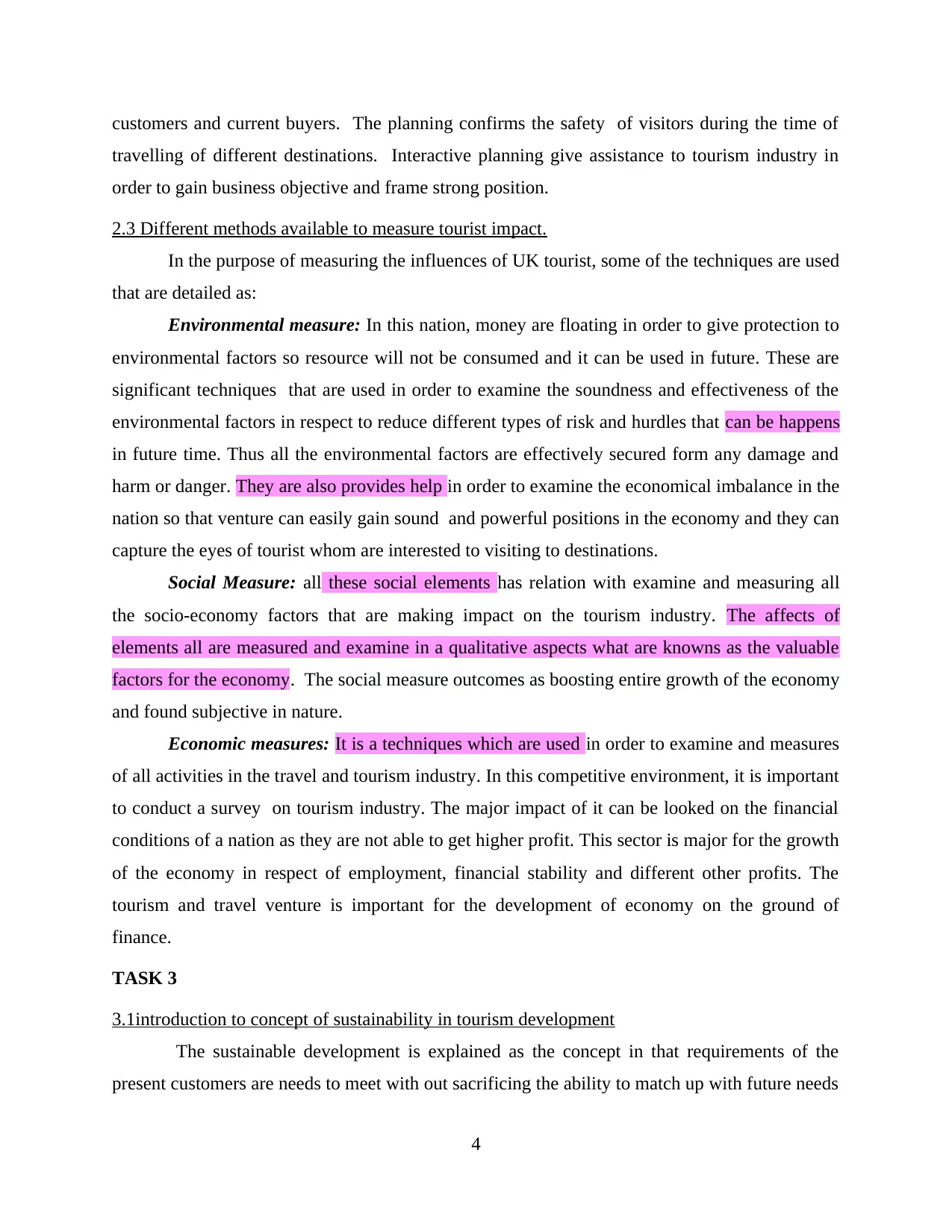
customers and current buyers. The planning confirms the safety of visitors during the time of
travelling of different destinations. Interactive planning give assistance to tourism industry in
order to gain business objective and frame strong position.
2.3 Different methods available to measure tourist impact.
In the purpose of measuring the influences of UK tourist, some of the techniques are used
that are detailed as:
Environmental measure: In this nation, money are floating in order to give protection to
environmental factors so resource will not be consumed and it can be used in future. These are
significant techniques that are used in order to examine the soundness and effectiveness of the
environmental factors in respect to reduce different types of risk and hurdles that can be happens
in future time. Thus all the environmental factors are effectively secured form any damage and
harm or danger. They are also provides help in order to examine the economical imbalance in the
nation so that venture can easily gain sound and powerful positions in the economy and they can
capture the eyes of tourist whom are interested to visiting to destinations.
Social Measure: all these social elements has relation with examine and measuring all
the socio-economy factors that are making impact on the tourism industry. The affects of
elements all are measured and examine in a qualitative aspects what are knowns as the valuable
factors for the economy. The social measure outcomes as boosting entire growth of the economy
and found subjective in nature.
Economic measures: It is a techniques which are used in order to examine and measures
of all activities in the travel and tourism industry. In this competitive environment, it is important
to conduct a survey on tourism industry. The major impact of it can be looked on the financial
conditions of a nation as they are not able to get higher profit. This sector is major for the growth
of the economy in respect of employment, financial stability and different other profits. The
tourism and travel venture is important for the development of economy on the ground of
finance.
TASK 3
3.1introduction to concept of sustainability in tourism development
The sustainable development is explained as the concept in that requirements of the
present customers are needs to meet with out sacrificing the ability to match up with future needs
4
travelling of different destinations. Interactive planning give assistance to tourism industry in
order to gain business objective and frame strong position.
2.3 Different methods available to measure tourist impact.
In the purpose of measuring the influences of UK tourist, some of the techniques are used
that are detailed as:
Environmental measure: In this nation, money are floating in order to give protection to
environmental factors so resource will not be consumed and it can be used in future. These are
significant techniques that are used in order to examine the soundness and effectiveness of the
environmental factors in respect to reduce different types of risk and hurdles that can be happens
in future time. Thus all the environmental factors are effectively secured form any damage and
harm or danger. They are also provides help in order to examine the economical imbalance in the
nation so that venture can easily gain sound and powerful positions in the economy and they can
capture the eyes of tourist whom are interested to visiting to destinations.
Social Measure: all these social elements has relation with examine and measuring all
the socio-economy factors that are making impact on the tourism industry. The affects of
elements all are measured and examine in a qualitative aspects what are knowns as the valuable
factors for the economy. The social measure outcomes as boosting entire growth of the economy
and found subjective in nature.
Economic measures: It is a techniques which are used in order to examine and measures
of all activities in the travel and tourism industry. In this competitive environment, it is important
to conduct a survey on tourism industry. The major impact of it can be looked on the financial
conditions of a nation as they are not able to get higher profit. This sector is major for the growth
of the economy in respect of employment, financial stability and different other profits. The
tourism and travel venture is important for the development of economy on the ground of
finance.
TASK 3
3.1introduction to concept of sustainability in tourism development
The sustainable development is explained as the concept in that requirements of the
present customers are needs to meet with out sacrificing the ability to match up with future needs
4
⊘ This is a preview!⊘
Do you want full access?
Subscribe today to unlock all pages.

Trusted by 1+ million students worldwide
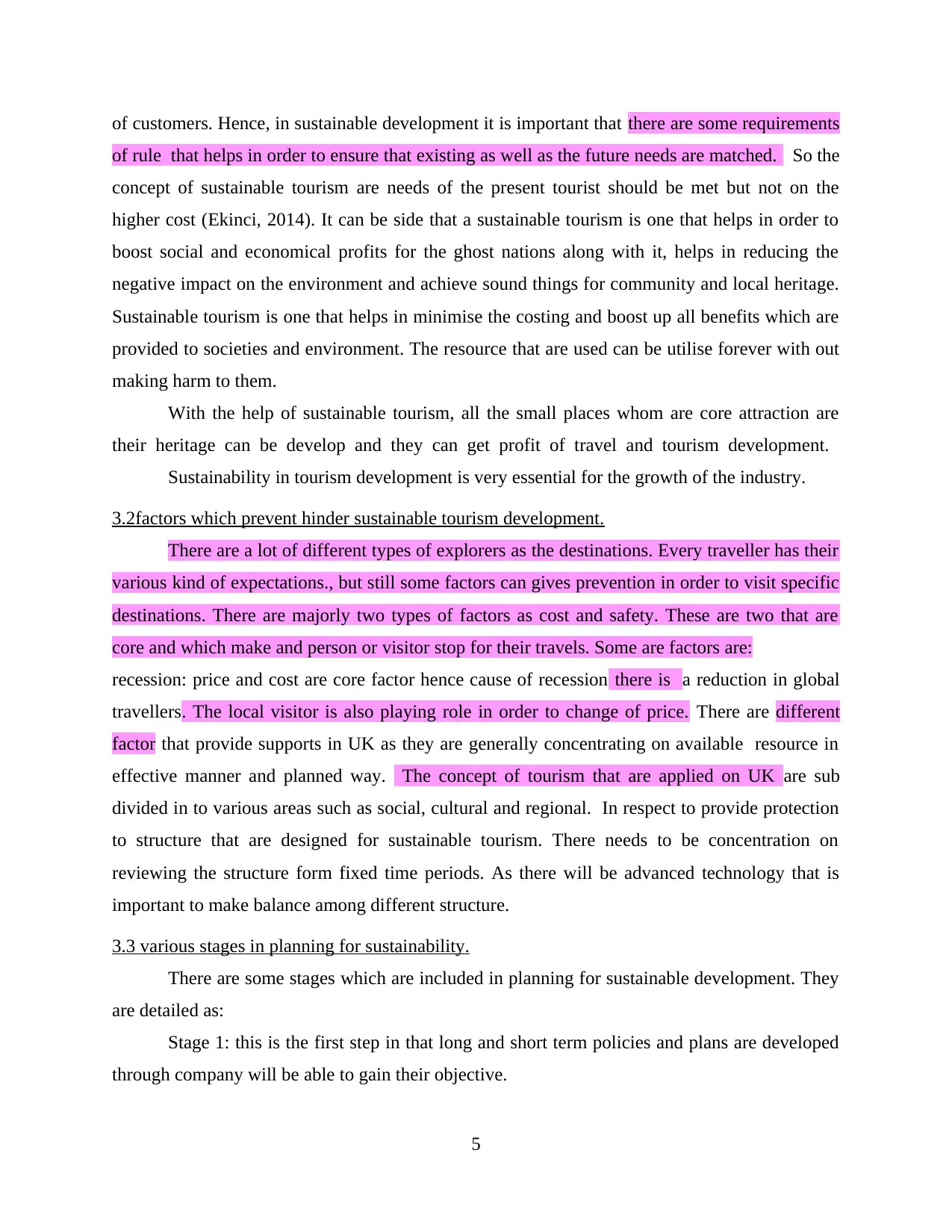
of customers. Hence, in sustainable development it is important that there are some requirements
of rule that helps in order to ensure that existing as well as the future needs are matched. So the
concept of sustainable tourism are needs of the present tourist should be met but not on the
higher cost (Ekinci, 2014). It can be side that a sustainable tourism is one that helps in order to
boost social and economical profits for the ghost nations along with it, helps in reducing the
negative impact on the environment and achieve sound things for community and local heritage.
Sustainable tourism is one that helps in minimise the costing and boost up all benefits which are
provided to societies and environment. The resource that are used can be utilise forever with out
making harm to them.
With the help of sustainable tourism, all the small places whom are core attraction are
their heritage can be develop and they can get profit of travel and tourism development.
Sustainability in tourism development is very essential for the growth of the industry.
3.2factors which prevent hinder sustainable tourism development.
There are a lot of different types of explorers as the destinations. Every traveller has their
various kind of expectations., but still some factors can gives prevention in order to visit specific
destinations. There are majorly two types of factors as cost and safety. These are two that are
core and which make and person or visitor stop for their travels. Some are factors are:
recession: price and cost are core factor hence cause of recession there is a reduction in global
travellers. The local visitor is also playing role in order to change of price. There are different
factor that provide supports in UK as they are generally concentrating on available resource in
effective manner and planned way. The concept of tourism that are applied on UK are sub
divided in to various areas such as social, cultural and regional. In respect to provide protection
to structure that are designed for sustainable tourism. There needs to be concentration on
reviewing the structure form fixed time periods. As there will be advanced technology that is
important to make balance among different structure.
3.3 various stages in planning for sustainability.
There are some stages which are included in planning for sustainable development. They
are detailed as:
Stage 1: this is the first step in that long and short term policies and plans are developed
through company will be able to gain their objective.
5
of rule that helps in order to ensure that existing as well as the future needs are matched. So the
concept of sustainable tourism are needs of the present tourist should be met but not on the
higher cost (Ekinci, 2014). It can be side that a sustainable tourism is one that helps in order to
boost social and economical profits for the ghost nations along with it, helps in reducing the
negative impact on the environment and achieve sound things for community and local heritage.
Sustainable tourism is one that helps in minimise the costing and boost up all benefits which are
provided to societies and environment. The resource that are used can be utilise forever with out
making harm to them.
With the help of sustainable tourism, all the small places whom are core attraction are
their heritage can be develop and they can get profit of travel and tourism development.
Sustainability in tourism development is very essential for the growth of the industry.
3.2factors which prevent hinder sustainable tourism development.
There are a lot of different types of explorers as the destinations. Every traveller has their
various kind of expectations., but still some factors can gives prevention in order to visit specific
destinations. There are majorly two types of factors as cost and safety. These are two that are
core and which make and person or visitor stop for their travels. Some are factors are:
recession: price and cost are core factor hence cause of recession there is a reduction in global
travellers. The local visitor is also playing role in order to change of price. There are different
factor that provide supports in UK as they are generally concentrating on available resource in
effective manner and planned way. The concept of tourism that are applied on UK are sub
divided in to various areas such as social, cultural and regional. In respect to provide protection
to structure that are designed for sustainable tourism. There needs to be concentration on
reviewing the structure form fixed time periods. As there will be advanced technology that is
important to make balance among different structure.
3.3 various stages in planning for sustainability.
There are some stages which are included in planning for sustainable development. They
are detailed as:
Stage 1: this is the first step in that long and short term policies and plans are developed
through company will be able to gain their objective.
5
Paraphrase This Document
Need a fresh take? Get an instant paraphrase of this document with our AI Paraphraser
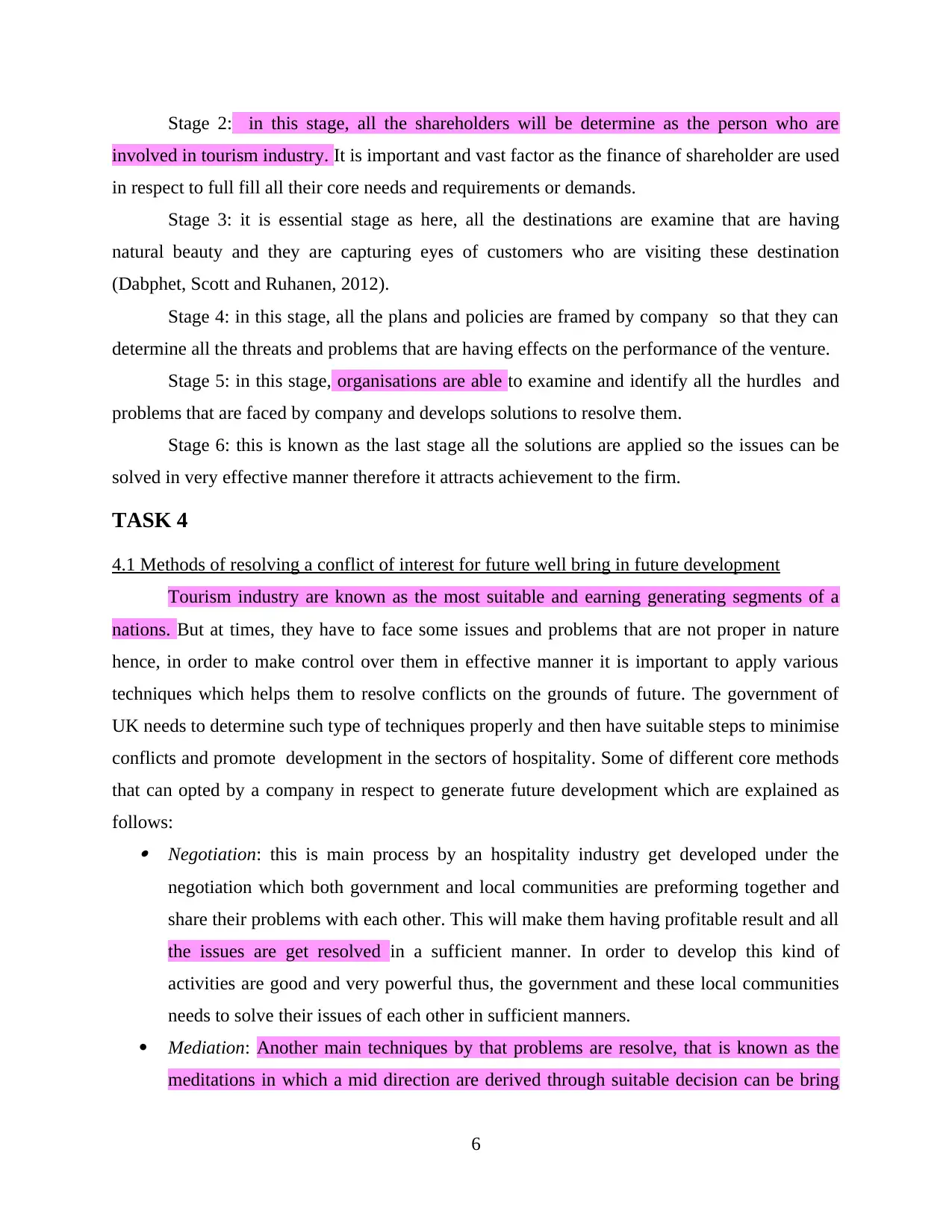
Stage 2: in this stage, all the shareholders will be determine as the person who are
involved in tourism industry. It is important and vast factor as the finance of shareholder are used
in respect to full fill all their core needs and requirements or demands.
Stage 3: it is essential stage as here, all the destinations are examine that are having
natural beauty and they are capturing eyes of customers who are visiting these destination
(Dabphet, Scott and Ruhanen, 2012).
Stage 4: in this stage, all the plans and policies are framed by company so that they can
determine all the threats and problems that are having effects on the performance of the venture.
Stage 5: in this stage, organisations are able to examine and identify all the hurdles and
problems that are faced by company and develops solutions to resolve them.
Stage 6: this is known as the last stage all the solutions are applied so the issues can be
solved in very effective manner therefore it attracts achievement to the firm.
TASK 4
4.1 Methods of resolving a conflict of interest for future well bring in future development
Tourism industry are known as the most suitable and earning generating segments of a
nations. But at times, they have to face some issues and problems that are not proper in nature
hence, in order to make control over them in effective manner it is important to apply various
techniques which helps them to resolve conflicts on the grounds of future. The government of
UK needs to determine such type of techniques properly and then have suitable steps to minimise
conflicts and promote development in the sectors of hospitality. Some of different core methods
that can opted by a company in respect to generate future development which are explained as
follows: Negotiation: this is main process by an hospitality industry get developed under the
negotiation which both government and local communities are preforming together and
share their problems with each other. This will make them having profitable result and all
the issues are get resolved in a sufficient manner. In order to develop this kind of
activities are good and very powerful thus, the government and these local communities
needs to solve their issues of each other in sufficient manners.
Mediation: Another main techniques by that problems are resolve, that is known as the
meditations in which a mid direction are derived through suitable decision can be bring
6
involved in tourism industry. It is important and vast factor as the finance of shareholder are used
in respect to full fill all their core needs and requirements or demands.
Stage 3: it is essential stage as here, all the destinations are examine that are having
natural beauty and they are capturing eyes of customers who are visiting these destination
(Dabphet, Scott and Ruhanen, 2012).
Stage 4: in this stage, all the plans and policies are framed by company so that they can
determine all the threats and problems that are having effects on the performance of the venture.
Stage 5: in this stage, organisations are able to examine and identify all the hurdles and
problems that are faced by company and develops solutions to resolve them.
Stage 6: this is known as the last stage all the solutions are applied so the issues can be
solved in very effective manner therefore it attracts achievement to the firm.
TASK 4
4.1 Methods of resolving a conflict of interest for future well bring in future development
Tourism industry are known as the most suitable and earning generating segments of a
nations. But at times, they have to face some issues and problems that are not proper in nature
hence, in order to make control over them in effective manner it is important to apply various
techniques which helps them to resolve conflicts on the grounds of future. The government of
UK needs to determine such type of techniques properly and then have suitable steps to minimise
conflicts and promote development in the sectors of hospitality. Some of different core methods
that can opted by a company in respect to generate future development which are explained as
follows: Negotiation: this is main process by an hospitality industry get developed under the
negotiation which both government and local communities are preforming together and
share their problems with each other. This will make them having profitable result and all
the issues are get resolved in a sufficient manner. In order to develop this kind of
activities are good and very powerful thus, the government and these local communities
needs to solve their issues of each other in sufficient manners.
Mediation: Another main techniques by that problems are resolve, that is known as the
meditations in which a mid direction are derived through suitable decision can be bring
6
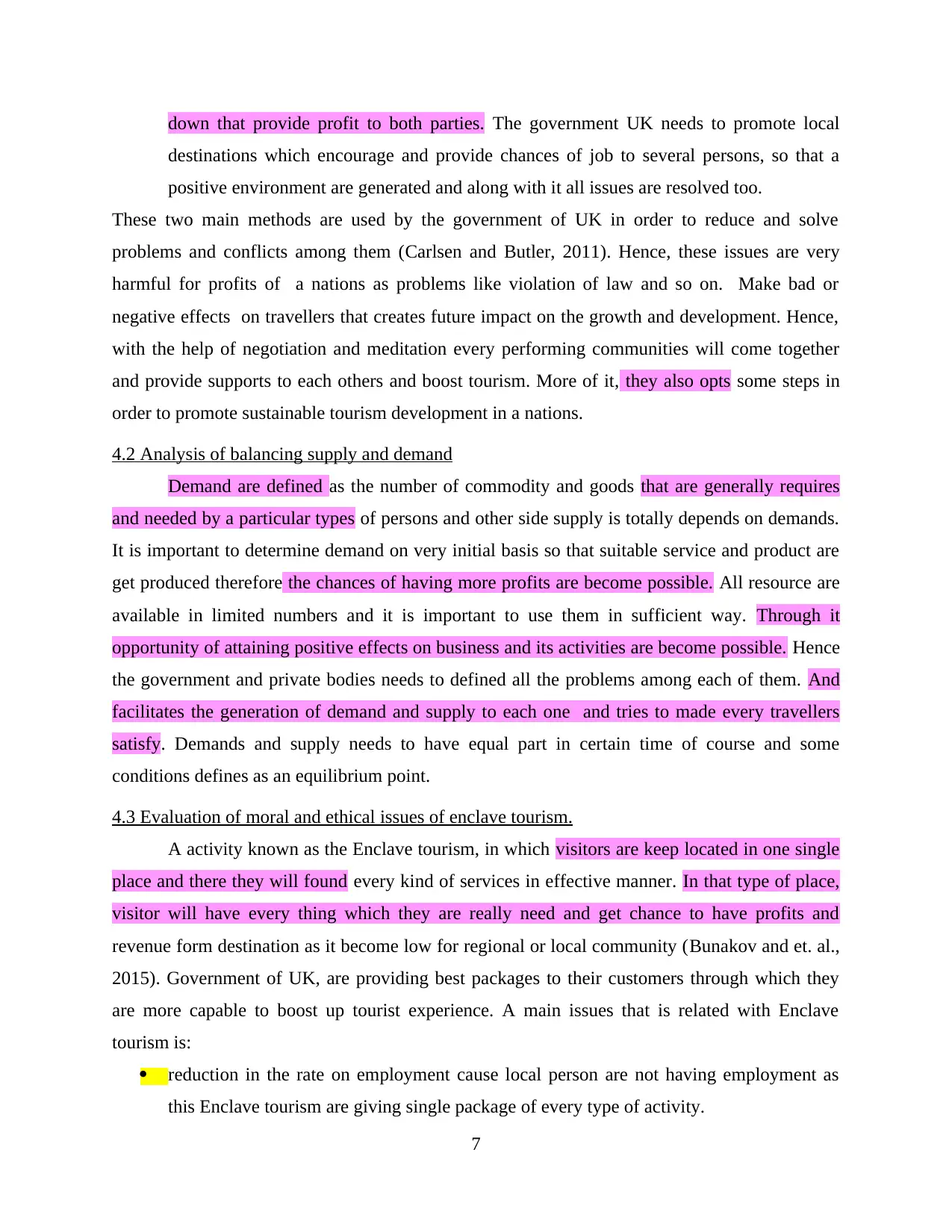
down that provide profit to both parties. The government UK needs to promote local
destinations which encourage and provide chances of job to several persons, so that a
positive environment are generated and along with it all issues are resolved too.
These two main methods are used by the government of UK in order to reduce and solve
problems and conflicts among them (Carlsen and Butler, 2011). Hence, these issues are very
harmful for profits of a nations as problems like violation of law and so on. Make bad or
negative effects on travellers that creates future impact on the growth and development. Hence,
with the help of negotiation and meditation every performing communities will come together
and provide supports to each others and boost tourism. More of it, they also opts some steps in
order to promote sustainable tourism development in a nations.
4.2 Analysis of balancing supply and demand
Demand are defined as the number of commodity and goods that are generally requires
and needed by a particular types of persons and other side supply is totally depends on demands.
It is important to determine demand on very initial basis so that suitable service and product are
get produced therefore the chances of having more profits are become possible. All resource are
available in limited numbers and it is important to use them in sufficient way. Through it
opportunity of attaining positive effects on business and its activities are become possible. Hence
the government and private bodies needs to defined all the problems among each of them. And
facilitates the generation of demand and supply to each one and tries to made every travellers
satisfy. Demands and supply needs to have equal part in certain time of course and some
conditions defines as an equilibrium point.
4.3 Evaluation of moral and ethical issues of enclave tourism.
A activity known as the Enclave tourism, in which visitors are keep located in one single
place and there they will found every kind of services in effective manner. In that type of place,
visitor will have every thing which they are really need and get chance to have profits and
revenue form destination as it become low for regional or local community (Bunakov and et. al.,
2015). Government of UK, are providing best packages to their customers through which they
are more capable to boost up tourist experience. A main issues that is related with Enclave
tourism is:
reduction in the rate on employment cause local person are not having employment as
this Enclave tourism are giving single package of every type of activity.
7
destinations which encourage and provide chances of job to several persons, so that a
positive environment are generated and along with it all issues are resolved too.
These two main methods are used by the government of UK in order to reduce and solve
problems and conflicts among them (Carlsen and Butler, 2011). Hence, these issues are very
harmful for profits of a nations as problems like violation of law and so on. Make bad or
negative effects on travellers that creates future impact on the growth and development. Hence,
with the help of negotiation and meditation every performing communities will come together
and provide supports to each others and boost tourism. More of it, they also opts some steps in
order to promote sustainable tourism development in a nations.
4.2 Analysis of balancing supply and demand
Demand are defined as the number of commodity and goods that are generally requires
and needed by a particular types of persons and other side supply is totally depends on demands.
It is important to determine demand on very initial basis so that suitable service and product are
get produced therefore the chances of having more profits are become possible. All resource are
available in limited numbers and it is important to use them in sufficient way. Through it
opportunity of attaining positive effects on business and its activities are become possible. Hence
the government and private bodies needs to defined all the problems among each of them. And
facilitates the generation of demand and supply to each one and tries to made every travellers
satisfy. Demands and supply needs to have equal part in certain time of course and some
conditions defines as an equilibrium point.
4.3 Evaluation of moral and ethical issues of enclave tourism.
A activity known as the Enclave tourism, in which visitors are keep located in one single
place and there they will found every kind of services in effective manner. In that type of place,
visitor will have every thing which they are really need and get chance to have profits and
revenue form destination as it become low for regional or local community (Bunakov and et. al.,
2015). Government of UK, are providing best packages to their customers through which they
are more capable to boost up tourist experience. A main issues that is related with Enclave
tourism is:
reduction in the rate on employment cause local person are not having employment as
this Enclave tourism are giving single package of every type of activity.
7
⊘ This is a preview!⊘
Do you want full access?
Subscribe today to unlock all pages.

Trusted by 1+ million students worldwide
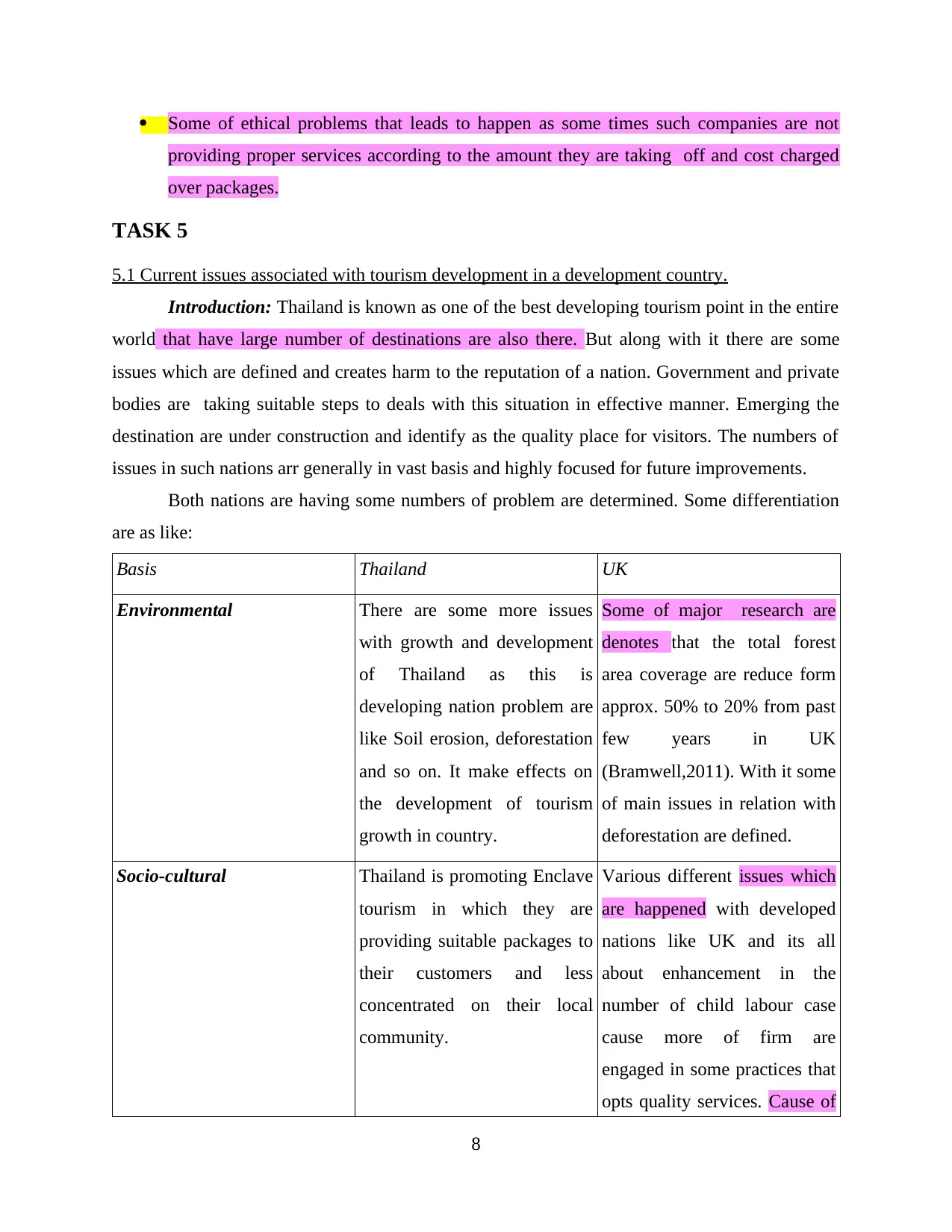
Some of ethical problems that leads to happen as some times such companies are not
providing proper services according to the amount they are taking off and cost charged
over packages.
TASK 5
5.1 Current issues associated with tourism development in a development country.
Introduction: Thailand is known as one of the best developing tourism point in the entire
world that have large number of destinations are also there. But along with it there are some
issues which are defined and creates harm to the reputation of a nation. Government and private
bodies are taking suitable steps to deals with this situation in effective manner. Emerging the
destination are under construction and identify as the quality place for visitors. The numbers of
issues in such nations arr generally in vast basis and highly focused for future improvements.
Both nations are having some numbers of problem are determined. Some differentiation
are as like:
Basis Thailand UK
Environmental There are some more issues
with growth and development
of Thailand as this is
developing nation problem are
like Soil erosion, deforestation
and so on. It make effects on
the development of tourism
growth in country.
Some of major research are
denotes that the total forest
area coverage are reduce form
approx. 50% to 20% from past
few years in UK
(Bramwell,2011). With it some
of main issues in relation with
deforestation are defined.
Socio-cultural Thailand is promoting Enclave
tourism in which they are
providing suitable packages to
their customers and less
concentrated on their local
community.
Various different issues which
are happened with developed
nations like UK and its all
about enhancement in the
number of child labour case
cause more of firm are
engaged in some practices that
opts quality services. Cause of
8
providing proper services according to the amount they are taking off and cost charged
over packages.
TASK 5
5.1 Current issues associated with tourism development in a development country.
Introduction: Thailand is known as one of the best developing tourism point in the entire
world that have large number of destinations are also there. But along with it there are some
issues which are defined and creates harm to the reputation of a nation. Government and private
bodies are taking suitable steps to deals with this situation in effective manner. Emerging the
destination are under construction and identify as the quality place for visitors. The numbers of
issues in such nations arr generally in vast basis and highly focused for future improvements.
Both nations are having some numbers of problem are determined. Some differentiation
are as like:
Basis Thailand UK
Environmental There are some more issues
with growth and development
of Thailand as this is
developing nation problem are
like Soil erosion, deforestation
and so on. It make effects on
the development of tourism
growth in country.
Some of major research are
denotes that the total forest
area coverage are reduce form
approx. 50% to 20% from past
few years in UK
(Bramwell,2011). With it some
of main issues in relation with
deforestation are defined.
Socio-cultural Thailand is promoting Enclave
tourism in which they are
providing suitable packages to
their customers and less
concentrated on their local
community.
Various different issues which
are happened with developed
nations like UK and its all
about enhancement in the
number of child labour case
cause more of firm are
engaged in some practices that
opts quality services. Cause of
8
Paraphrase This Document
Need a fresh take? Get an instant paraphrase of this document with our AI Paraphraser
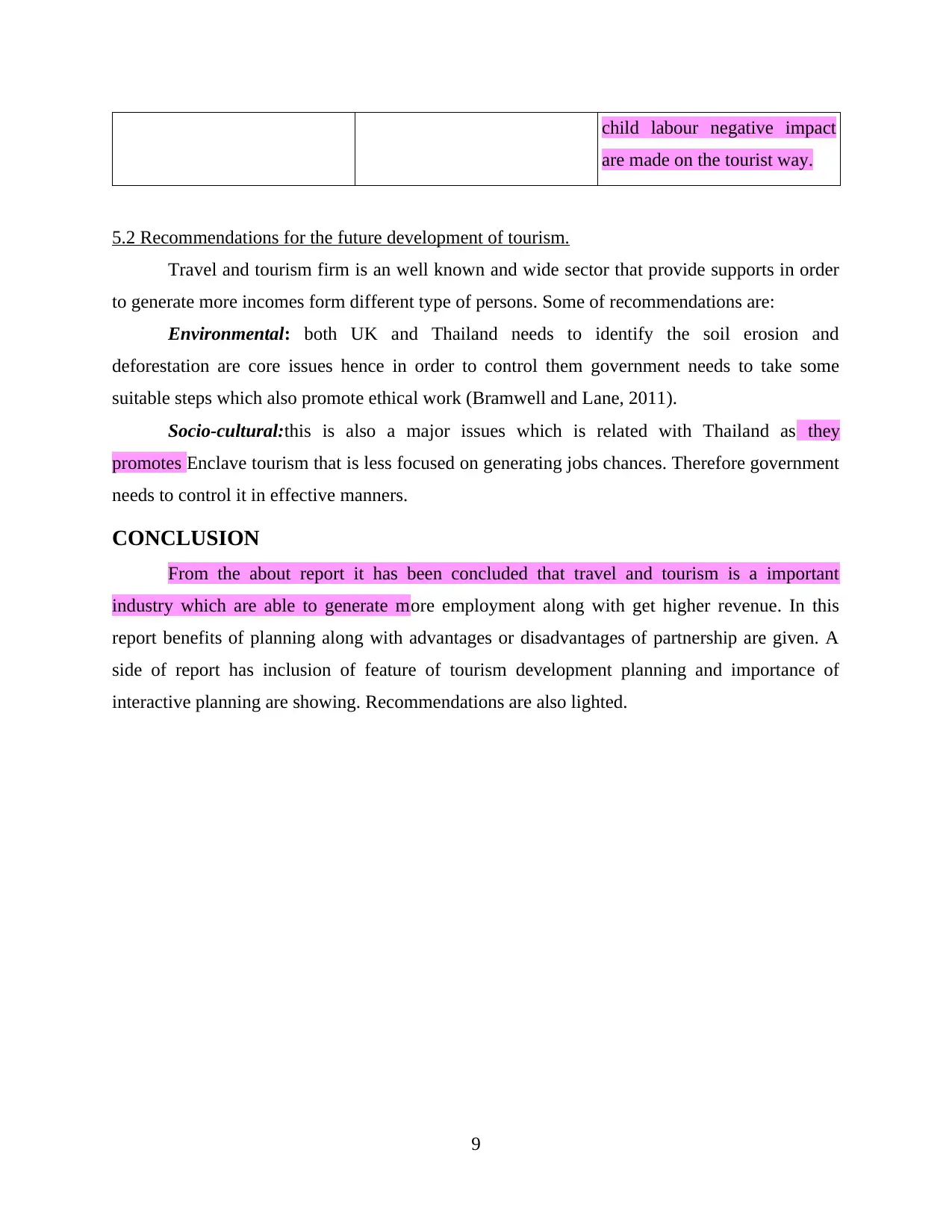
child labour negative impact
are made on the tourist way.
5.2 Recommendations for the future development of tourism.
Travel and tourism firm is an well known and wide sector that provide supports in order
to generate more incomes form different type of persons. Some of recommendations are:
Environmental: both UK and Thailand needs to identify the soil erosion and
deforestation are core issues hence in order to control them government needs to take some
suitable steps which also promote ethical work (Bramwell and Lane, 2011).
Socio-cultural:this is also a major issues which is related with Thailand as they
promotes Enclave tourism that is less focused on generating jobs chances. Therefore government
needs to control it in effective manners.
CONCLUSION
From the about report it has been concluded that travel and tourism is a important
industry which are able to generate more employment along with get higher revenue. In this
report benefits of planning along with advantages or disadvantages of partnership are given. A
side of report has inclusion of feature of tourism development planning and importance of
interactive planning are showing. Recommendations are also lighted.
9
are made on the tourist way.
5.2 Recommendations for the future development of tourism.
Travel and tourism firm is an well known and wide sector that provide supports in order
to generate more incomes form different type of persons. Some of recommendations are:
Environmental: both UK and Thailand needs to identify the soil erosion and
deforestation are core issues hence in order to control them government needs to take some
suitable steps which also promote ethical work (Bramwell and Lane, 2011).
Socio-cultural:this is also a major issues which is related with Thailand as they
promotes Enclave tourism that is less focused on generating jobs chances. Therefore government
needs to control it in effective manners.
CONCLUSION
From the about report it has been concluded that travel and tourism is a important
industry which are able to generate more employment along with get higher revenue. In this
report benefits of planning along with advantages or disadvantages of partnership are given. A
side of report has inclusion of feature of tourism development planning and importance of
interactive planning are showing. Recommendations are also lighted.
9
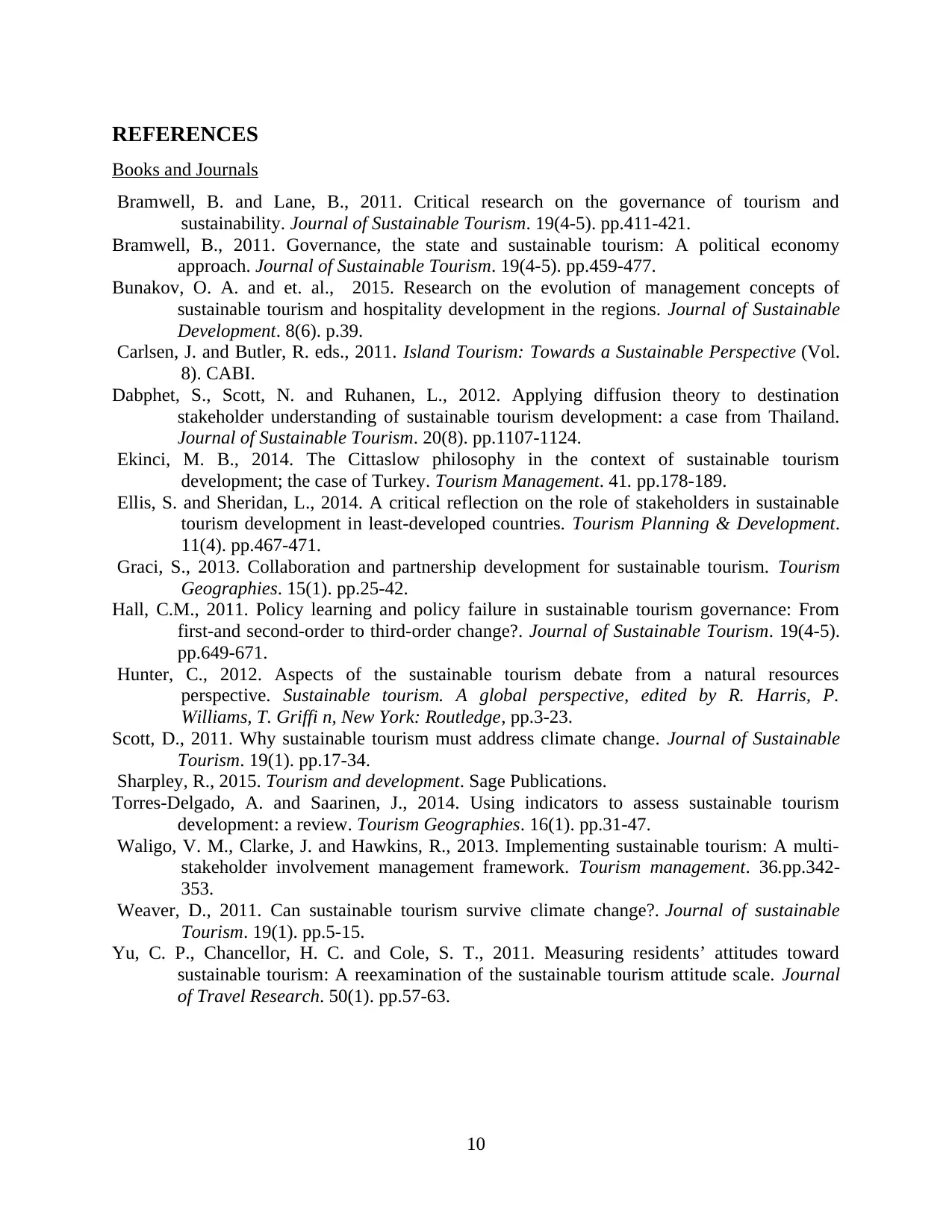
REFERENCES
Books and Journals
Bramwell, B. and Lane, B., 2011. Critical research on the governance of tourism and
sustainability. Journal of Sustainable Tourism. 19(4-5). pp.411-421.
Bramwell, B., 2011. Governance, the state and sustainable tourism: A political economy
approach. Journal of Sustainable Tourism. 19(4-5). pp.459-477.
Bunakov, O. A. and et. al., 2015. Research on the evolution of management concepts of
sustainable tourism and hospitality development in the regions. Journal of Sustainable
Development. 8(6). p.39.
Carlsen, J. and Butler, R. eds., 2011. Island Tourism: Towards a Sustainable Perspective (Vol.
8). CABI.
Dabphet, S., Scott, N. and Ruhanen, L., 2012. Applying diffusion theory to destination
stakeholder understanding of sustainable tourism development: a case from Thailand.
Journal of Sustainable Tourism. 20(8). pp.1107-1124.
Ekinci, M. B., 2014. The Cittaslow philosophy in the context of sustainable tourism
development; the case of Turkey. Tourism Management. 41. pp.178-189.
Ellis, S. and Sheridan, L., 2014. A critical reflection on the role of stakeholders in sustainable
tourism development in least-developed countries. Tourism Planning & Development.
11(4). pp.467-471.
Graci, S., 2013. Collaboration and partnership development for sustainable tourism. Tourism
Geographies. 15(1). pp.25-42.
Hall, C.M., 2011. Policy learning and policy failure in sustainable tourism governance: From
first-and second-order to third-order change?. Journal of Sustainable Tourism. 19(4-5).
pp.649-671.
Hunter, C., 2012. Aspects of the sustainable tourism debate from a natural resources
perspective. Sustainable tourism. A global perspective, edited by R. Harris, P.
Williams, T. Griffi n, New York: Routledge, pp.3-23.
Scott, D., 2011. Why sustainable tourism must address climate change. Journal of Sustainable
Tourism. 19(1). pp.17-34.
Sharpley, R., 2015. Tourism and development. Sage Publications.
Torres-Delgado, A. and Saarinen, J., 2014. Using indicators to assess sustainable tourism
development: a review. Tourism Geographies. 16(1). pp.31-47.
Waligo, V. M., Clarke, J. and Hawkins, R., 2013. Implementing sustainable tourism: A multi-
stakeholder involvement management framework. Tourism management. 36.pp.342-
353.
Weaver, D., 2011. Can sustainable tourism survive climate change?. Journal of sustainable
Tourism. 19(1). pp.5-15.
Yu, C. P., Chancellor, H. C. and Cole, S. T., 2011. Measuring residents’ attitudes toward
sustainable tourism: A reexamination of the sustainable tourism attitude scale. Journal
of Travel Research. 50(1). pp.57-63.
10
Books and Journals
Bramwell, B. and Lane, B., 2011. Critical research on the governance of tourism and
sustainability. Journal of Sustainable Tourism. 19(4-5). pp.411-421.
Bramwell, B., 2011. Governance, the state and sustainable tourism: A political economy
approach. Journal of Sustainable Tourism. 19(4-5). pp.459-477.
Bunakov, O. A. and et. al., 2015. Research on the evolution of management concepts of
sustainable tourism and hospitality development in the regions. Journal of Sustainable
Development. 8(6). p.39.
Carlsen, J. and Butler, R. eds., 2011. Island Tourism: Towards a Sustainable Perspective (Vol.
8). CABI.
Dabphet, S., Scott, N. and Ruhanen, L., 2012. Applying diffusion theory to destination
stakeholder understanding of sustainable tourism development: a case from Thailand.
Journal of Sustainable Tourism. 20(8). pp.1107-1124.
Ekinci, M. B., 2014. The Cittaslow philosophy in the context of sustainable tourism
development; the case of Turkey. Tourism Management. 41. pp.178-189.
Ellis, S. and Sheridan, L., 2014. A critical reflection on the role of stakeholders in sustainable
tourism development in least-developed countries. Tourism Planning & Development.
11(4). pp.467-471.
Graci, S., 2013. Collaboration and partnership development for sustainable tourism. Tourism
Geographies. 15(1). pp.25-42.
Hall, C.M., 2011. Policy learning and policy failure in sustainable tourism governance: From
first-and second-order to third-order change?. Journal of Sustainable Tourism. 19(4-5).
pp.649-671.
Hunter, C., 2012. Aspects of the sustainable tourism debate from a natural resources
perspective. Sustainable tourism. A global perspective, edited by R. Harris, P.
Williams, T. Griffi n, New York: Routledge, pp.3-23.
Scott, D., 2011. Why sustainable tourism must address climate change. Journal of Sustainable
Tourism. 19(1). pp.17-34.
Sharpley, R., 2015. Tourism and development. Sage Publications.
Torres-Delgado, A. and Saarinen, J., 2014. Using indicators to assess sustainable tourism
development: a review. Tourism Geographies. 16(1). pp.31-47.
Waligo, V. M., Clarke, J. and Hawkins, R., 2013. Implementing sustainable tourism: A multi-
stakeholder involvement management framework. Tourism management. 36.pp.342-
353.
Weaver, D., 2011. Can sustainable tourism survive climate change?. Journal of sustainable
Tourism. 19(1). pp.5-15.
Yu, C. P., Chancellor, H. C. and Cole, S. T., 2011. Measuring residents’ attitudes toward
sustainable tourism: A reexamination of the sustainable tourism attitude scale. Journal
of Travel Research. 50(1). pp.57-63.
10
⊘ This is a preview!⊘
Do you want full access?
Subscribe today to unlock all pages.

Trusted by 1+ million students worldwide
1 out of 12
Related Documents
Your All-in-One AI-Powered Toolkit for Academic Success.
+13062052269
info@desklib.com
Available 24*7 on WhatsApp / Email
![[object Object]](/_next/static/media/star-bottom.7253800d.svg)
Unlock your academic potential
Copyright © 2020–2026 A2Z Services. All Rights Reserved. Developed and managed by ZUCOL.




